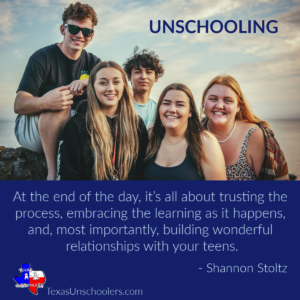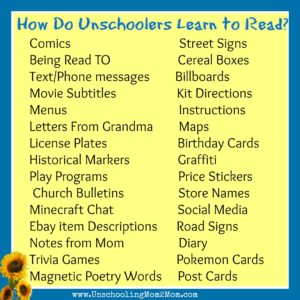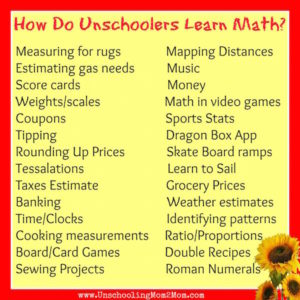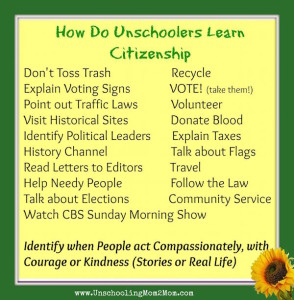Guest Post by Shannon Stoltz
“All she wants to do is…” The first time I heard this phrase a friend was lamenting about how she wanted her then 15 year old daughter to get a summer job or do something similarly “productive”. That was to be the first of many times I’ve heard a parent of a 12/13 year old or 15/16 year old say, “All she/he wants to do is…”
Parenting and homeschooling, no matter the style, changes around 12/13 and again around 15/16. The relationship between parent and child, particularly if you are coming from more conventional philosophies, changes. Our children are more independent, exploring ideas and activities that interests them. And that doesn’t always match up with our own expectations.
When how our vision for our children’s path is different than what our kids’ are actually doing, fear creeps in and we get statements like:
“All she wants to do is sit in her room reading and writing in her journal.”
“All she wants to do is draw.”
“All he wants to do is hang out with his friends and skateboard.”
“All she wants to do is hang out with her friends and party.”
“All he wants to do is work.”
“All he wants to do is play basketball and hang out at church”
“All he wants to do is play games with his friends on the computer.”
But in reality, what our children are pursuing is actually building a foundation for their future. We just don’t yet know what that future looks like, and that can be scary.
For us as parents, this is a time to let go of our agenda for our kids and embrace their journey in becoming the unique individuals they are. It’s a time to learn how to support our children differently than we have done before, to see them as their own person and support them where they are at. It’s not an easy parental transition, especially if you have had compliant kids or come from an authoritarian background.
For our teens, this is a time of learning who they are as people, experimenting, developing relationships, and testing ideas, forming and discussing ideas and opinions with others outside the family. Unschooling at this age level is fabulous because it is all about trusting the process, building relationships, and supporting the kids where they are at.
My kids have deep dived into interests from 12 and up. We’ve gone through periods of intense focus into manga, anime, robotics, blacksmithing, cake decorating, working, Minecraft, archery, gaming of all types, survival skills, art, writing, digital drawing, herbal medicine, horses, chinese light novels, theater, the list goes on. Weeks, months, and even years of a focus and then it shifts or fine tunes further.
I’ve seen their friends do the same. And their parents, across all styles of education, struggle with the change – that their kids are no longer malleable to what they want them to do – and then have to figure out how to support their kids where they are.
Early on this journey of being a mom of teens, I remember literally sitting on my hands and biting my lip, as I watched my son, then 13, working through a difficult task, approaching it differently than I would. But instead of telling him what and how to it, I restrained myself and honored that he wanted – and needed – to go through the process of figuring it out himself. He knew that he could ask for input, instead he asked me to bring him food and to sit with him as a companion and listen to his thought process, and be there for support. I needed to respect that. Now, at nearly 17, he still often asks me to bring him food, and to be there to listen to him share his ideas, stories, and thought processes.
One of the big differences between unschooling, especially radical unschooling, and other styles of education and parenting is that word RESPECT. With unschooling, especially in the teen years, it’s not about our kids respect for us and their showing respect to us or other adults. Instead, it’s about us showing respect to them — to their ideas, interests, and needs. It’s another level of giving, of pouring into. It’s about respecting their needs and supporting them.
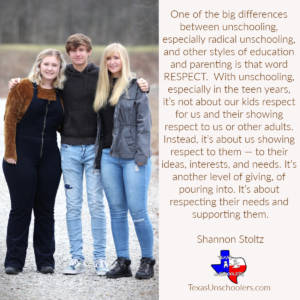
For a social kid who wants to hang with their friends, it’s about providing an environment to do so. For a kid with an online community, it’s about respecting that’s where their friends are and treating them with dignity and respect, and supporting their collaborations and time together. For a kid who likes to spend hours by themselves (often in the middle of the night), it’s about letting them and making sure they have the resources they need. And when they want to talk and share, to be there for them – to listen, encourage, support, and help them find the resources they are looking for.
For an unschooler, “All he/she wants to do is…” becomes an opportunity – an opportunity to engage and connect, to encourage and support, and to facilitate your child’s interest – no matter how obscure. And it becomes an opportunity to grow yourself, as a parent and as a individual. At the end of the day, it’s all about trusting the process, embracing the learning as it happens, and, most importantly, building wonderful relationships with your teens.
–Shannon Stoltz
Learn more about Shannon on our Contributors page.
